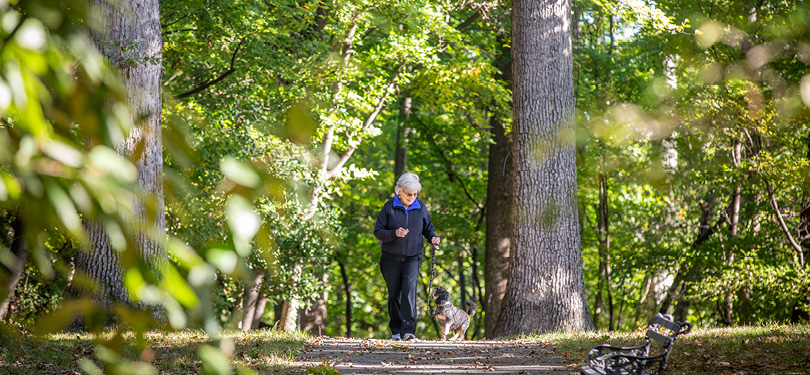With spring right around the corner, here at Knollwood, we start to look forward to the reawakening of plants and wildlife. Along with that excitement comes a renewed emphasis on conservation and restorative efforts for our local ecosystem.
In 2023, Knollwood partnered with the Maryland and D.C. Chapter of The Nature Conservancy (TNC) to develop and install a stormwater-capturing and filtering green infrastructure and garden that would help offset runoff flowing into local rivers. This system helps to prevent the pollution of local treasures like Rock Creek, the Potomac River, and the Chesapeake Bay with millions of gallons of runoff pollution.
So, why was Knollwood a perfect fit for the project?
Located in the northwest neighborhood of Washington, D.C., Knollwood is a lush, quiet oasis nestled in a more urban landscape. Across the property, sidewalks, paved roads and paths are made with materials that retain heat and don’t allow water to be filtered through. The more impervious surfaces there are in an area, the more rainwater and runoff mingle together with things like oil, dirt, and other harmful materials.
In D.C., there is a Clean Rivers Impervious Area Charge (CRIAC) that helps fairly “distribute the cost of maintaining storm sewers and protecting area waterways based on a property’s contribution of rainwater to the District’s sewer system.”
Colonel Paul Bricker, former COO and CFO of Knollwood, noticed that Knollwood’s charge on this count was high, due to its many sidewalks, driveways, and parking lots—all impervious surfaces contributing to runoff pollution.
He reached out to The Nature Conservancy’s Maryland and D.C. chapter to find the best solution, as they had worked with other communities on such efforts in the past.
TNC came to the table with the idea of a rain garden to capture runoff, and purify the water by filtering through various natural layers including mulch, stone and other eco-friendly materials to filter out dangerous sediment in the water. And, with the additions of various plants, contaminants have a place to be soaked up and filtered. By the time the water leaves the garden, it’s that much cleaner than when it entered.
“These types of projects can also help with urban heat islands; the plants can provide habitats for different birds and insects,” says Aileen Craig of TNC.
In the past, Knollwood has put its sprawling campus to use when it comes to environmental conservation and preservation efforts. One example is their participation in #NoMowMay—a universal effort that lets grass, wildflowers, and other native plants grow freely—in-turn providing essential nutrients to bees and other pollinators.
With so much open space available on property, and existing investment in greener projects like campus greenery/foliage and gardens maintained by its residents, Knollwood was an ideal spot for this effort.
“The Nature Conservancy really came alongside us, and guided us through this entire process,” Col. Brickers says.
From the first steps of development, TNC brought in environmental engineers to survey the land, got permitting and entitlements approved with the city, oversaw the project and executed all maintenance—all at their own cost.
John Higgins, a Knollwood resident and former D.C. Advisory Neighborhood Commissioner, says he knew this effort was going to be successful from the start.
“We have a lot of people involved in gardening and in taking care of the community. This was just another opportunity here for them to use their talents,” said Higgins.
In the end, the garden has proven to be a tool of function AND beauty, providing yet another wonderful, natural element to add to Knollwood’s dynamic campus.
“It’s a win-win,” Bricker says. “It’s a win because we can help protect the environment, and it’s a win because it lowers our expenses here for our residents, and overall for the foundation that runs Knollwood,” he added.
Col. Bricker hopes Knollwood’s collaboration with TNC in this project can inspire other communities and nonprofits to do the same.
“If it helps even one community to do this, then it’s worthwhile.” Bricker says.
For more information on Knollwood’s collaboration with the Nature Conservancy, visit: https://youtu.be/mqNmuvgl5Tk.
_______________________
Interested in experiencing the beauty of Knollwood first-hand?
Call (202) 541-0149 to schedule a personal tour!
